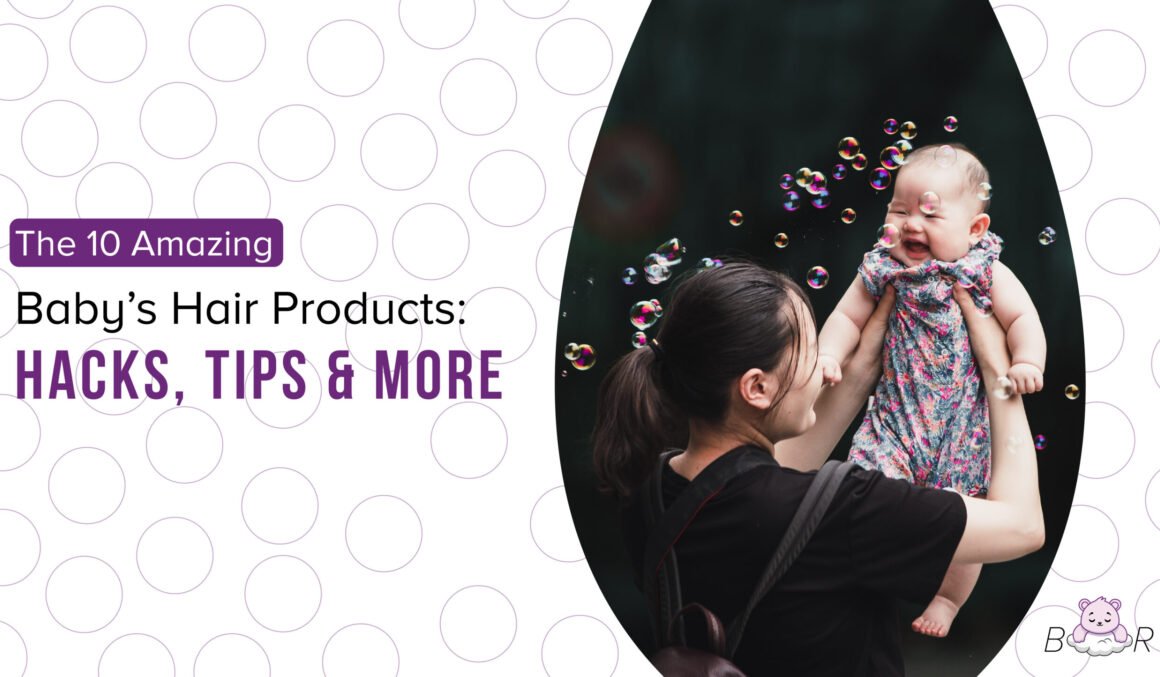How to Get Rid of Baby Acne: Causes, Treatments, Duration & More
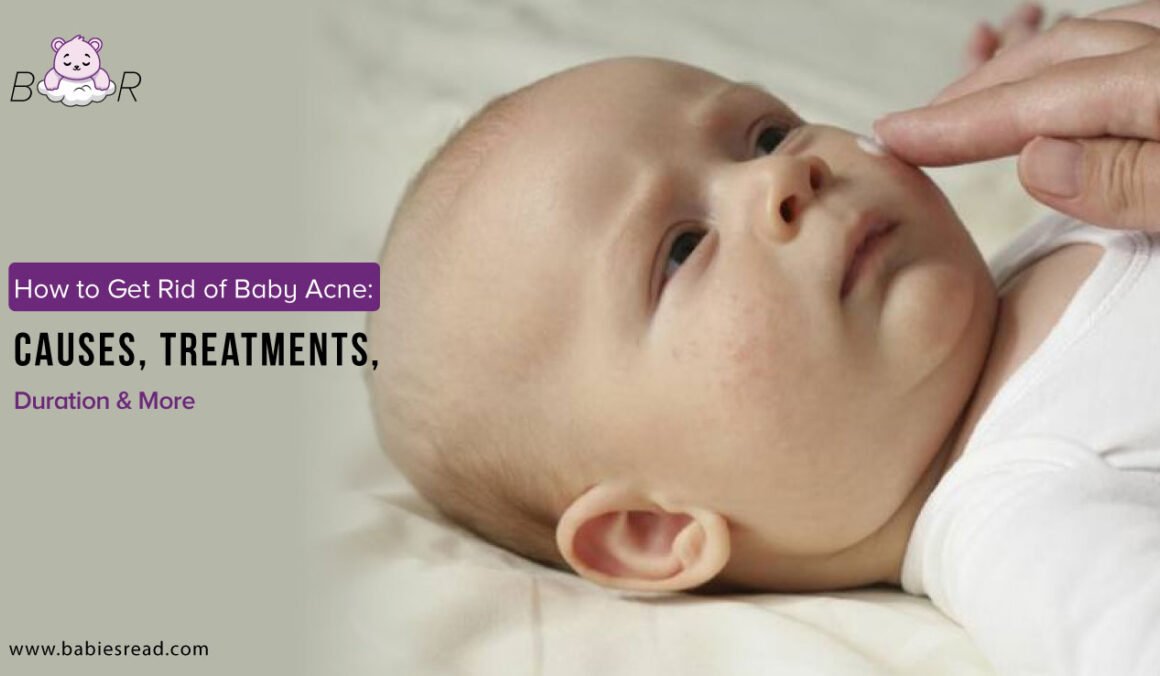
Baby acne usually goes away within three or four weeks after birth.
In normal circumstances, no medication or treatment is needed to cure acne on your baby’s face.
However, if the newborn’s acne last for longer, your healthcare provider may recommend a medicated cream or opt for another treatment.
My baby had acne when she was two to three weeks old, and by the time she entered her first month, her acne had vanished like it was never there.
Also, thinking that only teens get acne is wrong because research tells us that nearly 20% of babies are born with acne, and it’s completely normal.
Now if your baby has acne and you want to get rid of them, then you’re at the right place because today, I’ll be explaining what causes baby acne, how to get rid of it, and whether it is bothering your little one or not, and much more.
Let’s dive into the world of baby acne and find a baby-friendly treatment!
Table of Contents
What Causes Baby Acne?
Before learning how to treat baby acne, understanding what causes it is essential.
Similar to teenage acne, hormones are the ones that cause baby acne.
In the case of newborns, however, it’s not their own hormones causing the acne but their mom’s hormones which are still present in the newborn’s bloodstream as a holdover from pregnancy. This is the primary cause of baby acne.
The maternal hormones tend to stimulate your baby’s oil-producing glands, causing pimples on the forehead, nose, chin, and cheeks. Sometimes they also pop up on the head, back, scalp, or neck.
Another thing you need to know is that your baby’s skin is still developing; hence, they’re an easy target for dirt or blemishes to infiltrate.
Moreover, your baby’s skin is also super delicate, so you’ll see their skin peeling off or flaky. But, again, this is completely normal and doesn’t require any special treatment.
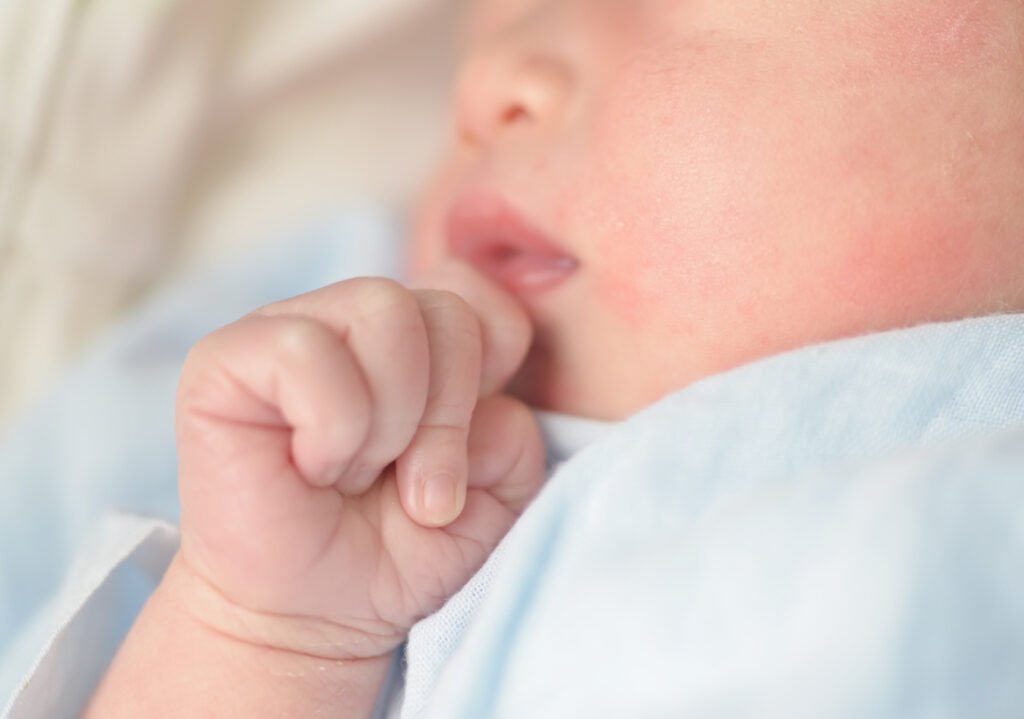
What Is Baby Acne?
Baby acne is small red or white bumps or pimples that appear on babies’ skin. They’re reddish and may become more prominent as your baby cries.
The cheeks, nose, and chin are where baby acne generally occurs. However, they can also appear on other body parts, i.e., the back, scalp, chest, or neck. Also, baby acne closely resembles adolescent acne.
To calm you down, I would say that baby acne is completely harmless. Still, getting your baby checked by a healthcare practitioner or pediatrician is always better.
Moreover, the American Academy of Dermatology divides acne into two main categories:
Neonatal Acne
Neonatal acne, also known as newborn acne, affects 20% of newborns and develops between the ages of two to six weeks. However, in some cases, babies are born with acne.
Infantile Acne
Typically occurring when your baby reaches the age of three to six months, this acne is a little more complicated than newborn acne. Parents tend to mistakenly consider this acne as eczema, rash, allergy, or milia, but this is acne.
However, since it becomes difficult for parents to diagnose what’s happening to their baby, it’s always better to consult a child’s specialist to get things checked.
What Are the Symptoms of Baby Acne?
Symptoms of baby acne include small pimples popping up on your baby’s face, nose, cheeks, chin, or forehead, followed by a slight reddish coloration of your baby’s skin.
Neonatal acne, however, isn’t anything to worry about as they rarely cause scars and tend to go away in a few weeks or months (more on this later). Also, 3 out of 10 babies generally get acne.
When Baby Acne Goes Away?
Neonatal acne tends to go away within a few weeks or 3 to 4 months of your baby’s birth. This is the time period when you take most of the pictures of your little one. I know because most of the pictures I took of my daughter are from when she was a few weeks to 7 months old.
If you’re thinking that baby acne would leave scars or marks on your baby’s face, there’s no need to worry about it because neonatal acne doesn’t leave permanent marks like the grown-up version of the acne does in teens or adults.
Getting Rid of Baby Acne for Good
There’s no surefire way to treat baby acne because neonatal acne tends to go away in a few weeks or months.
However, there are a few caring tips that I would want you to know if in-case your baby has acne:
How to treat baby acne:
- Clean the area where your baby has neonatal acne
- Do not rub, press, scrub, or try to pick up acne
- Don’t use soap or lotion to cleanse the affected area
- Do not use acne-reducing products that are meant for adults
- Treat newborn acne with home remedies for acne. You’ll find several over the internet
- The healing process is already in progress, and this gentle care routine will only speed it up
- Always concern your pediatrician before using any medicine or if acne doesn’t go away after several months.
Other Baby Acne Treatments
As mentioned earlier, baby acne treatments are generally not required because baby acne tends to clear up on its own after some time (within 3 to 4 weeks) after birth.
However, if you’re concerned about treating your baby’s acne or if it persists even after weeks or months of care, it’s time to go to the doctor.
Do not go for any medication or prescription without concerning your doctor.
This brings us to our next topic, when is acne problematic for parents and babies?
When is Acne Problematic for Parents & Babies?
Once you’ve tried the home remedies for baby acne and it persists after 4 to 6 months, it’s time to go to the doctor. This may be the case of infantile acne mentioned above in this blog.
Infantile acne occurs when your baby is 3 to 4 months old, and the best way to get rid of infantile acne is to go see a board-certified dermatologist or pediatrician. You’ll get plenty of information from there.
Here are some points to keep in mind before going out to visit the doctor:
- Determining if your baby has acne or some other skin condition, i.e., eczema or skin infection is crucial.
- If acne persists or begins when your baby is 6 to 8 months old, it may be a sign of a health problem. In addition, a blood test or skin examination may reveal crucial details about your baby’s health.
- Neonatal acne doesn’t cause scars, but infantile acne can cause scars. Still, a pediatrician can help you prevent scars on your baby’s skin.
- Since a baby’s skin is super gentle and delicate, some products can cause baby acne, so it’s essential to discuss the products you’re using and ask if they’re safe for your baby.
Learn to Differentiate Between Baby Acne & Rash
Both baby acne and rashes can be identical and can confuse parents, but they’re not to be considered one and the same.
Also, they both are common in newborns and toddlers, so it is vital to learn how to differentiate between baby acne and rash to treat both differently.
Where baby acne would look like reddish pimples on the nose, chin, and other body parts, as specified above, a baby rash is tiny bumps or whiteheads.
Both conditions, however, require the same treatment, gentle cleansing, washing, observing & waiting.
In addition, baby rash also involves different types of rashes, which can be uncomfortable for your baby. They can spread across the face, on the neck, in the baby’s diaper area, and beyond.
Here’s a quick rundown on the different types of baby rashes:
- Seborrheic dermatitis, better known as cradle cap, are tiny red bumps smaller than acne and may come accompanied by yellow, flaky skin that looks like scales.
- Baby heat rashes are clusters of tiny red bumps that resemble acne but appear on arms, feet, legs, and in the diaper area. The reason? You guessed it, heat!
- Diaper rash comes next and is caused by moisture and too little air. They appear as red, irritated skin in the diaper area.
How to Diagnose Baby Acne?
The best way to get baby acne diagnosed is by visiting a certified pediatrician or healthcare practitioner to get your baby checked.
If diagnosed, your healthcare practitioner will give you the best advice on how to get rid of baby acne.
You’ll also get to know if your baby has acne, rash, or eczema.
If your baby has a rash, eczema, or acne, you can expect the healthcare provider to prescribe some treatment, such as an ointment, to help your baby get rid of acne.
Please don’t use the DIY (do it yourself) approach here.
And don’t buy over-the-counter medicine, creams, or ointments; start applying them to your baby’s skin.
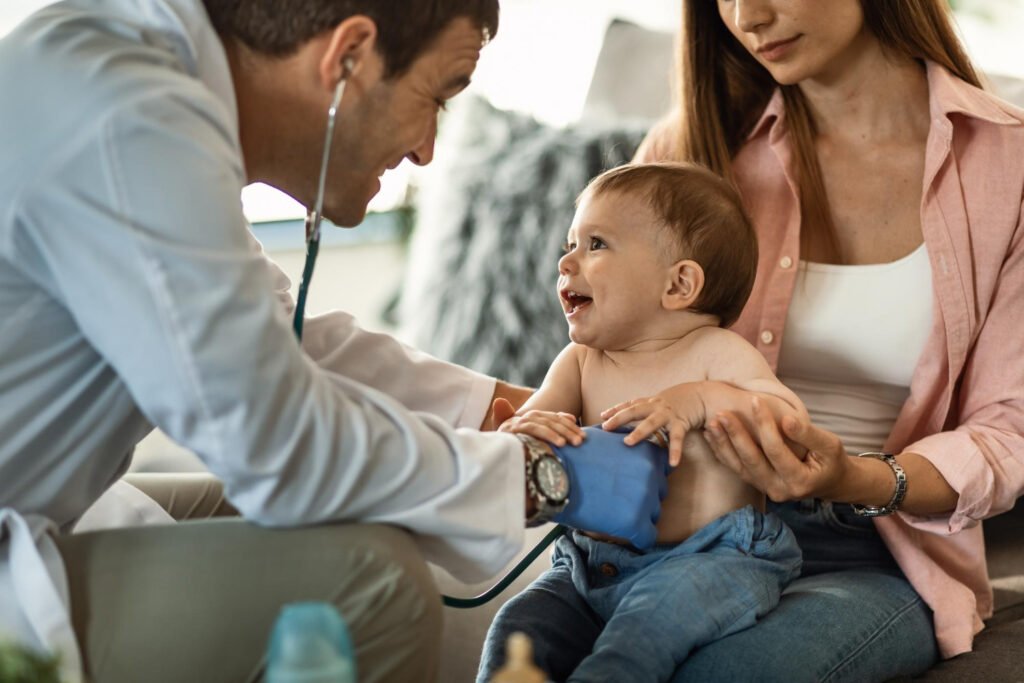
When to Visit the Doctor to Get Your Baby Checked?
As discussed earlier, neonatal acne isn’t anything to worry about; it generally goes away on its own without leaving any scars or marks on your baby’s skin.
But if the acne doesn’t go away and the bumps look as if they’re infected, or your baby starts feeling irritated, it’s time to go to the doctor.
Also, if swelling, reddishness, or other types of medical conditions such as fever occur, you can get in touch with your pediatrician.
Additionally, if the acne persists for a long, it may be an allergy or eczema, so be sure to visit the doctor so that they can prescribe medicine for it.
To sum it up, here are the things you need to look out for:
- Allergy
- Swelling
- Fever
- Irritation
- Rash
- Reddishness
The Takeaway
I compiled all the information on baby acne, simplified it, and provided it to you.
If your baby gets acne now, you’ll know what you have to do when you have to go to the doctor, how to get rid of baby acne, and you know the treatments for baby acne.
Initially, you can wait for the acne to go on its own.
And while doing so, just carefully observe and determine if that’s acne on your baby’s face or something else, i.e., heat rash or swelling.
If it’s something else, go to the doctor; if not, let it be, and it’ll pass on its own. And when the acne passes, it’s time to give those little cuddly cheeks tons of kisses and a shower.
Speaking of showers, here’s a list of some of the best baby shampoos that’ll leave your baby’s hair feeling nourished, shiny, smooth, and aromatic, so be sure to read this article.
Disclaimer
The information in this article has been taken from trusted medical and government websites. Also, my daughter experienced acne when she was a few weeks old and rash when she was 3-month-old so, so I went through this; therefore, I know the best approach to tackle baby acne. I’ve also linked the trusted medical websites above to see where I get most of the information. Last but not least, always consult a pediatrician or healthcare provider to get your baby’s condition diagnosed or medicine prescribed.
Images by Freepik.
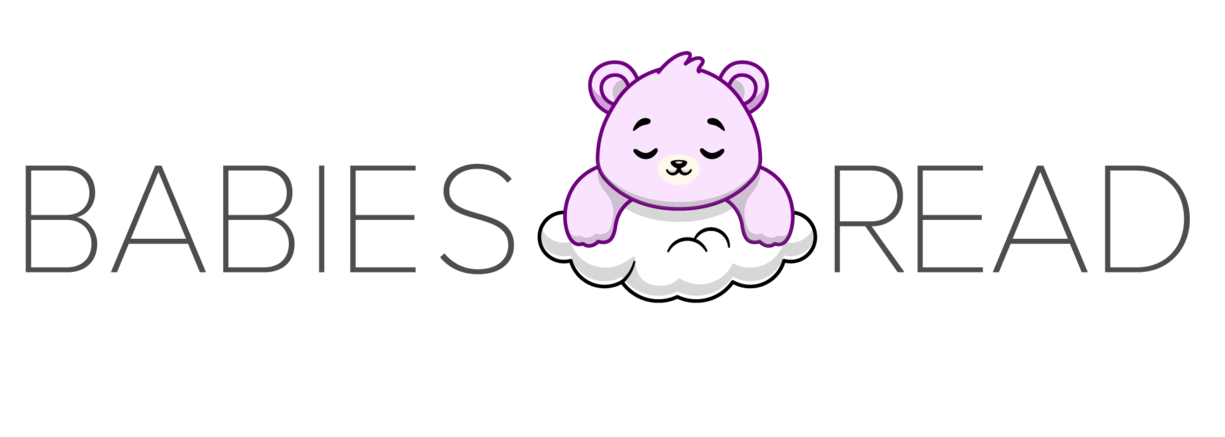
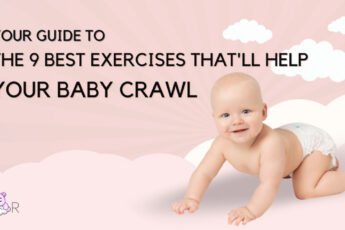
![The 10 Best Baby Bouncers to Buy in 2024 [Updated]](https://babiesread.com/wp-content/uploads/2023/09/The-12-Best-Baby-Bouncers-in-2023-e1694030856211.jpg)

